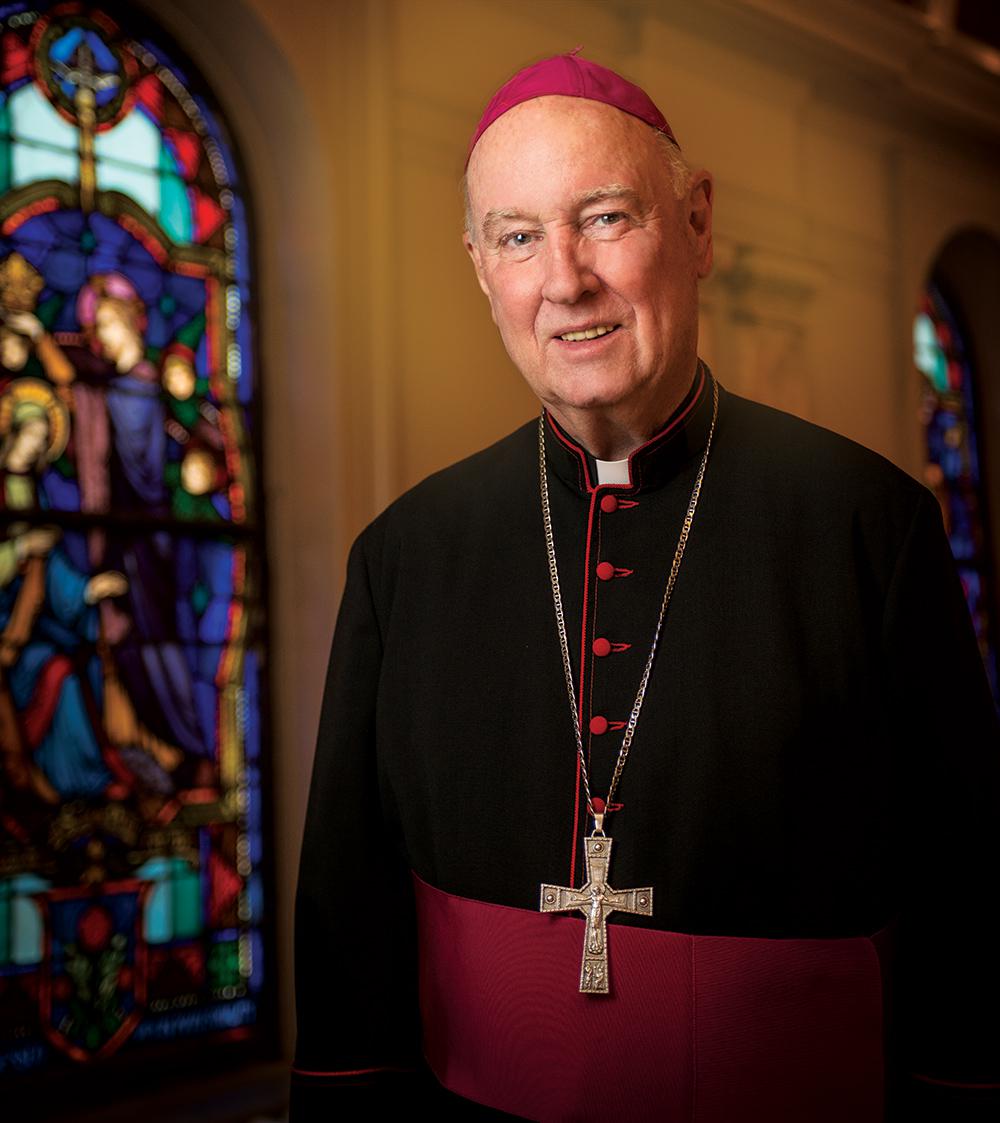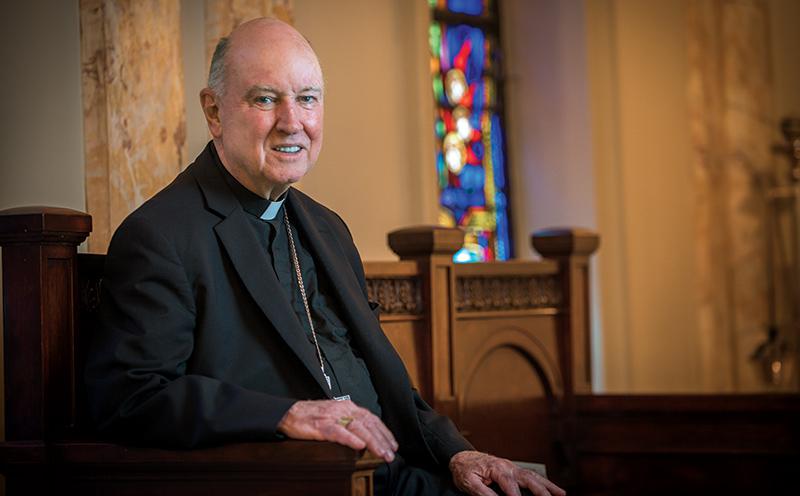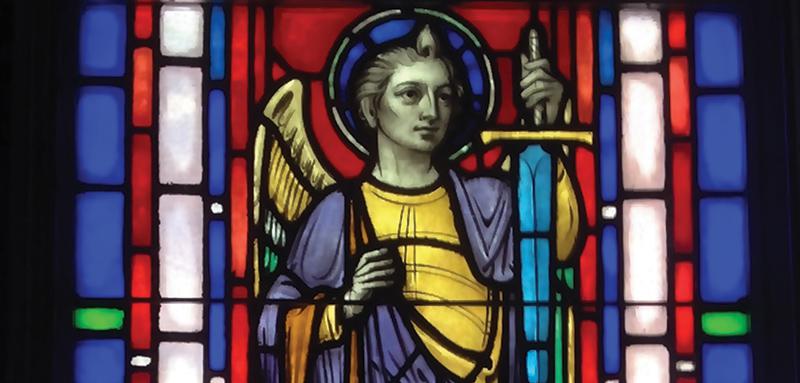|
Bishop Malooly Talks "The Francis Effect"
By Kevin Noonan
On the eve of meeting the pope during his visit to the United States, Wilmington Bishop W. Francis Malooley reflects on the Catholic Church and the role of this populist pontiff—who even takes selfies with congregants. John Baesch and Fran Malooly were typical kids growing up in a middle-class Baltimore neighborhood in the 1940s and 1950s. They lived in modest, one-family homes, went to St. Ursula Catholic grade school, played sports together, went to school dances and did what most kids did in those postwar years. But there was a difference. “Fran was normal as could be. He was just like the rest of us,’’ Baesch says. “At the same time, we all knew that he was better than the rest of us.’’ His friends sensed that W. Francis Malooly had already heard God’s voice calling to him. He was spending a lot of time at St. Ursula, his Parkville parish church—an involvement that would lead him to the priesthood and, eventually, to become the ninth bishop of the Diocese of Wilmington. “That’s really where the seed was planted,” Baesch says. “Fran became an altar boy as soon as he was old enough, and he even took a night job working the telephone in the rectory. He got to see how the parish worked in a very intimate way, and he got to see how parish priests operated on a day-to-day basis.” Malooly remembers how impressed he was by the priests’ devotion and their enthusiasm to their calling. “They just had something special about them and the way they went about their business,’’ he says. “They related to the people of the parish really well, and they had so much energy, and they did so many positive things for people. And what really struck me was how much joy they had in everything they did.’’ After eighth grade, Malooly went into the seminary, though his family had reservations about him taking such a big step before he had a chance to experience life. They didn’t need to worry. “Every year, I would come home for the summer and be with my friends and play summer-league basketball and just do all the normal things someone my age would do,’’ Malooly says. “I would also reflect on my life and pray about my vocation, and, over the years, my commitment got stronger. And 12 years later, I was ordained.’’ The ceremony, fittingly enough, took place at St. Ursula, just a long jump shot away from the Malooly family home. Bishop Malooly’s pastoral path has led him over the years from his hometown to Wilmington, where he has served since 2008. It hasn’t always been easy. His ministry has taken place during difficult times for the Catholic Church—notably the child-abuse scandal and a decrease in priestly vocations. But Malooly is encouraged by Pope Francis’ leadership of the church and is looking forward to his visit to the United States in September, when he will make stops in Philadelphia, New York and Washington. He says the pope shares a quality with Pope (now Saint) John Paul II that is very important at this time in history—an ability to energize young Catholics around the world. “They both bring a real human touch to everything they do, and people really relate to them,’’ Malooly says. “They have a way of connecting with people, and especially young people, and that’s something we need. To have Pope Francis visit America, and especially to have him come to our backyard, so to speak, is a real shot in the arm.” It’s especially important in today’s information age, Malooly says, where images are flashed around the world in an instant, and people who used to only read what the pope had to say can now see and hear him at almost any time. “The pope has such a joy about him and that really comes through,’’ Malooly says. “He did a confirmation recently and then, afterward, spent 20 minutes taking selfies with the young people. Those human touches have a tremendous impact.’’ Malooly will meet the pope in Washington, not Philadelphia, and it’s an experience he is looking forward to as he heads toward retirement. Malooly is 71, and canon law dictates that he must resign as bishop at 75. A Pastoral JourneyAfter being ordained a priest on May 9, 1970, Malooly started his career in the church the way he envisioned it—working as a parish priest and ministering to his flock the way the parish priests did at St. Ursula. He spent several years in Texas before being transferred back to Baltimore in 1976, where he assumed he would once again take on pastoral duties at one of the archdiocese’s parishes. But his diocesan superiors noticed Malooly’s natural leadership abilities, so they started giving him positions of responsibility and authority, where his personality and energy could best serve the church. “That’s not surprising to me or anybody who knew Fran,’’ says his longtime friend Baesch. “He was always a leader, and it just came naturally to him. He didn’t say a lot, and when he did, it was always in his soft-spoken way. But he could also be firm, and people naturally looked up to him and followed his lead. And he led by example—he didn’t just preach at you. He was always polite and respectful to everybody, and he was just more polished than the rest of us. He stood out because of the kind of person he was.’’ Malooly was eventually named auxiliary bishop of the Archdiocese of Baltimore and, in 2001, took over those duties, which included supervising 38 parishes in Western Maryland. Several of those parishes were in remote areas, and some didn’t even have a regular parish priest. “I just kind of ended up with those jobs,’’ Malooly says. “I didn’t ask for them, and I had no special training in those areas or a strong interest in management. But I was willing to do whatever the church called me to do.’’ That experience led to Malooly being named Bishop of Wilmington—a natural fit, he says, since he was from nearby Baltimore and already knew several priests in the diocese he would eventually lead. He was installed as bishop of Wilmington at St. Elizabeth Catholic Church on Sept. 8, 2008. In the congregation for the installation rite was Baesch, who drove from Baltimore to see his old friend honored by the church they both love. “It was a great experience,’’ Baesch says. “It was something I’ll remember the rest of my life.’’ The Past and the FutureMalooly has had to face several challenges as bishop of Wilmington, including the child-abuse scandal that rocked the Catholic Church like nothing else in its 2,000-year history. He realizes the victims still suffer. “You can’t blame them for not being at peace,’’ Malooly says. “These horrible crimes committed against them came at a time in their life before they even had a realization of life. We can never forget those crimes, and we can never think for a moment that we can put this behind us or act like it never happened. Those crimes were done, and many people are not healed, and we can’t pretend it didn’t happen.’’ Judy Miller, who is the Delaware chapter president of Survivors Network of Those Abused by Priests, has found Malooly receptive to her group. He offered to meet with any abuse survivors who wanted to see him, and he gave his parishes permission to publicize the support group. At the same time, Miller believes Malooly and other bishops are sometimes more concerned about the church’s image than the abuse survivors’ well-being. “He certainly seems sincere, and he always says all of the right things,’’ Miller says. “But he’s also a company man, and he played it by the playbook, just like the other dioceses did.’’ Miller refers to 2009, when the Diocese of Wilmington became the seventh American diocese to declare Chapter 11 bankruptcy before making settlements with abuse survivors who had sued the diocese. “They all did the same thing: They brought out the lawyers, just when the survivors thought this was going to end,’’ Miller says. “So he was no different than any other bishop faced with it. He comes across as caring, but how pastoral was he when he turned it over to his lawyers?’’ Malooly’s supporters point out that the bishop is more than a man of the cloth. He is also an administrator responsible for 57 parishes and 24 schools in 12 counties on the Delmarva Peninsula, and he has to look after their welfare as well. Malooly makes no real effort to defend himself. He knows some wounds will never heal, no matter what he says. “I tried to give my best pastoral concern during the bankruptcy procedures with the [legal] team representing those survivors, but I wouldn’t say we’re at peace with each other,’’ Malooly says. “I’ll give my best going forward to be as responsive as I can, but I have no sense of whether that’s adequate, or should be. I’d like to think I’ve been helpful, but I just don’t know.’’ Another concern for Malooly and the rest of the Catholic Church—and he quickly points out it’s insignificant next to the abuse scandals—is the decreasing number of priestly vocations in recent years. The current population of priests is aging, and there aren’t enough young replacements. The situation has led the bishop to develop a new parish structure. With this model, priests must shuttle between churches to meet different needs and, in some parishes, lay deacons are being given more responsibility for managerial roles and some pastoral duties. Shifting Catholic demographics has also forced the diocese to merge some schools. Malooly is working on the issue. “The parishes and schools are still strong, and we expect them to stay that way,’’ Malooly adds. “We’ve developed a plan, and I think we’re in good position, and the diocese can move ahead.’’ Until he retires, Malooly hopes to continue leading the Wilmington diocese in a positive direction. His legacy is to be determined. “I’ve been blessed to live a long life and to be of some service to people,’’ he says. “I never had a plan for my life other than to serve God to the best of my ability. Eventually, “He” will be the one who judges whether that has been enough.’’
|
.
Any original material on these pages is copyright © BishopAccountability.org 2004. Reproduce freely with attribution.


